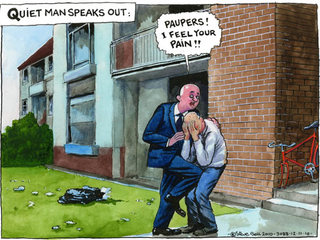
The politics of the situation couldn't be more stark. The Tories' strongest gambit has always been their cruel-but-competent line, and it seems enough voters have allowed them to get on with it as long as a) they're not the ones at the sharp end, and b) the Tories appear to have got the engine running smoothly and it's motoring the country in the right direction. This is where things are starting to get tricky.
Their bloody-minded treatment of the junior doctors, the forced u-turn on bashing the disabled, and now their seeming willingness to let 40,000 steel and supported jobs disappear is widening the pool of folk at the sharp end. These are "the strivers", not the skivers. The second is their "vision thing", the much-heralded but entirely vapid "long-term economic plan" is supposedly about Britain's manufacturing renaissance, a rebalanced economy both away from the South East and financial services, and some nonsense about "march of the makers". With all these infrastructure projects in the pipeline and the decision to replace Trident to be taken soon, to have the core base of your manufacturing economy facing shutdown is a headache the Tories could do without, especially when they're singly ill-equipped to deal with it.
There is a cultural/political dimension over the refusal to do for Port Talbot what Labour did for the banks. Part of it is their utter indifference to the fates of the industrial worker. "They do not give a shit", as Paul Mason puts it. And part of it is their deeply skewed, deeply sectional view of how the world works. Taking at face value Tata's claim that Port Talbot is losing just under a million a day (a figure that, rightly, isn't entirely accepted by all concerned), should the government take it on the tax payer could lose up to £350m/year. I say lose, but this money would support tens of thousands of jobs, keep communities viable, prevent many thousands from developing physical and mental health problems, and still churn out a useful product at the end of it. All this is invisible to the Tories, and yet they have zero issue with a £2bn loss for RBS last year, contributing to a colossal £50bn flushed down the proverbial since 2008. What's good for finance isn't good for strategic heavy industry, it seems.
From the Tories' point of view, confronted with China flooding global markets with cheap steel (they have to keep the mills running at the price of severe social dislocation and likely unrest) there is little point having a British steel industry. If steel gets nationalised, then what industry will next ask for a bail out? And what would that do to the chancellors finely-tuned (cough) figures? Well, that's assuming the Tories are spinning a wrong but honestly-held view. The evidence suggests otherwise. It transpires that the Tories have spearheaded efforts to prevent the European Union from doing anything about Chinese steel dumping - in other words, this isn't the headwinds of the global economy mindlessly wrecking all in its wake, the destruction is aided and abetted by our government. Just think about the absurdity of it for a moment: a right wing Conservative government is letting a strategic industry collapse to curry favour with the world's leading communist power. There is profaning the sacred, and then there is this.
The question remains whether they're willing to take another political hit for their intransigence. It's worth noting Jeremy Corbyn was on the ground immediately traipsing around and offering a very clear Labour view - not bad for an "ineffective leader". Meanwhile, all the government can do is dither and mouth platitudes about finding the best solution, which will probably mean throwing subsidies and guarantees at a buyer whereby the profits are privatised and the losses effectively nationalised. Unfortunately for them, coming on top of all their recent difficulties it's hard to see how continued inaction won't inflict considerable political damage to their rapidly re-toxifying brand. It's the least that they deserve.













